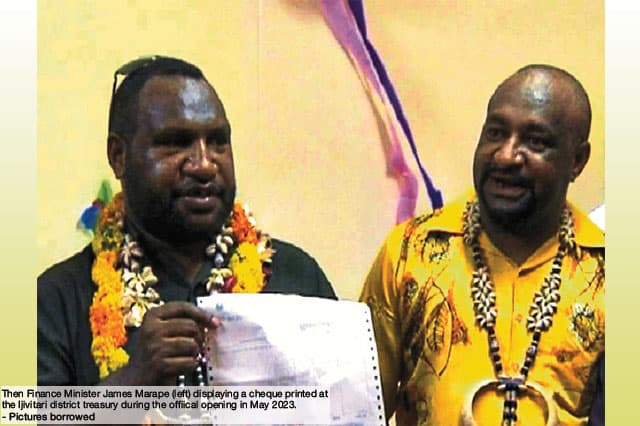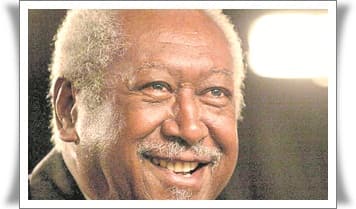TEMPTATION TO CORRUPT

THE NATIONAL (February 3rd 2023)
By FRANK SENGE KOLMA (fskolma@gmail.com)
The three service improvement programmes, introduced with the best of intentions, have had their purpose thwarted so much so that their very presence today invites corruption.
They are corruptive and tending towards corruption.
I am not saying the Provincial, District and Local Level Government services improvement programmes, going out at an easy K1.2 billion per budget, are corrupt in themselves. They are just funding under a programme like any other government budgetary allocation. Neither am I saying the politicians and others in the system who deal with the funds are corrupt.
The system through which the funds pass, however weak and ineffective it might be, is not corrupt.
But the very existence of these funds are a temptation and attract corrupt activities in every direction. The politician might want to keep more than he gives away or put the funds to uses other than those provided under the guidelines or he might want to form a company and pay himself for services his company provides to the electorate. Other people at the district development authority who handle the fund might similarly be tempted to take short cuts or mismanage or misappropriate as the desire gets them.
The people, well aware of the existence of the funding, may corruptly apply for funding for non-existent projects or push their MP and his officers to disburse funding outside of the guidelines.
The services improvement programme funds, therefore, provide temptation and attract corruption and then engender and grow corruption once it is in.
Weak systems
This happens because the systems for the disbursement of the funds is weak, politically aligned, and the guidelines are unenforceable by any competent authority.
Their purpose tends more towards political rather than developmental ends.
They are unfairly and unevenly distributed along politically expedient lines so that in any one year some provinces and districts which members might be in the Opposition, for instance, get far less than they ought to. Others who are in Government get their fair share and then some more.
These funds have never been audited by the Auditor General. No district or province has presented a report on the use of these huge public funds to Parliament and there is no requirement for it.
The public accounts of PNG has no extensive report of its disbursement and use, even though it should. There simply is no record of its use that can be relied upon for inclusion in the public accounts.
The Member of Parliament and his team from the DDA are relied upon solely to produce acquittals of programmes and projects to the Office of Rural Development.
The Office of Rural Development has nil capacity to double check on the acquittals and takes them at face value and files them away.
The Permanent Parliamentary Public Accounts Committee has never inquired into the use of this substantial outlay under the budget and probably never will because its membership is composed exclusively of Members of Parliament. There is no impartial inquiry member here.
Billions spent, negligible impact
The developmental impact of the services improvement programmes is negligible despite many years and many billions of kina spent. They ought to be done away with or programmed through a different channel, away from direct contact by politicians.
A discretionary fund for members has been in existence since 1982 when then Prime Minister, the late Sir Michael Somare, introduced a Villages Services Scheme with the humble sum of K10,000 per member. Even then, it was referred to as the ‘slush fund’ and the PM was soundly criticised for it in the media. Successive governments have introduced the fund in ever increasing amounts to the present day.
From K10,000 it has added three more zeros to become K10 million and that is not enough. Serious suggestions are afoot to increase that to K20 million and that might happen sooner rather than later. It will not stop there.
I remember the laughter in Parliament attracted by Maprik MP and the longest serving member of the house, Sir Pita Lus, in around 1987 when he suggested the fund be increased to K1 million or K1.5 million for each MP. At the time the fund was already K250,000 per MP.
Today MPs would laugh for the opposite reason. They would think it preposterous if one of them suggested reducing the funds back down to just K250,000.
The present services improvement programmes have a separate beginning to the discretionary funds per member introduced by Sir Michael in 1982.

Bart Philemon, the father of service improvement programme, only his intention has been thwarted.
Philemon’s pet project
When the Somare Government returned to power following the 2002 national elections, Member for Lae Bart Philemon was elevated to Finance and Treasury Ministry. He introduced, along with the Fiscal Responsibility Act and several very important financial and economic management interventions, a district treasury roll-out programme.
This programme began to establish district treasuries in all district headquarters throughout the country. This was his brainchild and his pet project. He visited each district, traversing places like Telefomin, Gumine and Buin, crying to see the people cry to see the face of government again.
He built up to six houses for district treasury officials, gave cars and boats, built treasury buildings complete with satellite links and telephones lines. In arrangements with BSP and Post PNG an agency for both companies was established at each district.
Each district could now prints cheques that could be cashed on site by public servants and service providers without having to travel the long distances to the provincial headquarters. Businesses and individuals could now bank on location and use postal services. Up to six telephone lines were available to the public.
The idea, in Philemon’s own words, was to “bring the government back to the people”.
It was the biggest move since Independence by the National Government to reintroduce government back to the districts.
The treasury rollout was to be followed by an even bigger district services rollout programme with a budget of K10 million per district.
Having established the paymaster back in the district, this next plan was to bring the whole complement of government services back to the district. A contingent of police, education, health, and agriculture officers were to be inserted and stationed permanently in the district.
Politics intervenes
Alas, that was not to be. Politics intervened. Flush with success from the treasury rollout, Philemon got ambitious. He put up his hand to contest the ;eadership of the National Alliance Party against Sir Michael.
He was roundly trounced and lost his ministry. His successor Patrick Pruaitch took office, saw an excellent opportunity and put a political spin to it. The K10 million for the districts could remain but he threw the civil service component of the plan out the door and gave the money to his fellow politicians to deliver to their districts. So was born the District Services Improvement Programme under its present guise.
Shortly after that the governors cried “unfair” and immediately got their Provincial Services Improvement Programme at K5 million per district in the province and in the interest of fairness also, the Local Level Government Presidents were each allocated K500,000 as LLGSIP.
And that brings us to the present.
If we take 2004 as a starting point and start calculating the amounts disbursed through this mechanism at just about K1 billion per year, we can see a neat K19 billion spent under this programme up to 2023, an amount that PNG could use to build its own next LNG plant, an amount for which there ought to be substantial footprints. Those footprints, except in a very few districts, have been washed out by the rains.
It is an open channel where billions more will be flushed down with no hope that this criminal waste of public funds will ever be stopped or inquired into.
These funds shut up even the most honest member of parliament. He knows the fund is corruptive. But the corruptive cries from the electorate for coffin boxes, for school fees, to build a church or for plain cash, is too deafening, too overpowering. Each of the 118 members in Parliament uses the services improvement programme to appease his or her supporters and keep political opponents at bay. The programme is used, with the MP as its chairman, for straight political gain and nobody will do a thing about it.
Not a politician at any of the country’s three levels of government will raise a whimper. They are most effectively silenced because they get to benefit directly, if not materially then in the power the fund gives them to control and distribute the money. It is their political safety net and that has been proven in very many elections so far.
The 22 provinces are controlled by governors who benefit from the Provincial Services Improvement Programme going out at K5 million per electorate under present arrangement. Each district is controlled by Open Members who get allocated K10 million each year.
Each of the council wards in the districts are controlled by council presidents who are given K500,000 each under the LLG Services Improvement Programme funds.
And here is the rub: All the services improvement programme funds are meant for the same lot of people – only distributed via three different politicians from the three different political strata in existence in PNG – national, provincial and local level government.
Let me explain. The LLGSIP of K500,000 per LLG and delivered by the president is meant for the wards of a district. But then the district (electorate) gets K10 million under the District Services Improvement Programme which is delivered by the member of parliament. And then each district is again given K5 million through the Provincial Services Improvement Programme via the governor.
I count here K15.5 million (K5 m + K10 m + K500,000) each year for every electorate in PNG.
Across one term of Parliament which is five years each electorate in the country ought to be given K75 million under the present arrangement and if the funds are distributed evenly. That is a hell lot of money by any standards and ought to make a difference if applied diligently as per stipulated directions.
No such policy exists anywhere on the planet which gives the politician absolute power to distribute cash at will as does PNG’s services improvement programme funds.
Ditch SIP funding
I repeat: The Services Improvement Programme funds ought to be done away with or distributed via a different channel away from direct contact with the politician.
Until then, immediately a requirement should be introduced as part of the guidelines for each district to produce two reports each year, a mid-year and an end-of-year report to be published publically in the newspapers showing use of SIP funds. The end of the year report should then be tabled in Parliament.
In the absence of an audit capacity, this publication will at least get the people of each district to examine and to declare whether or not the projects and programmes entering the acquittal reports do actually exist.
That would be a powerful deterrent to the temptation to fudge figures and draw up imaginary projects.
